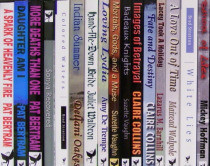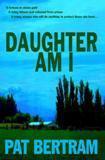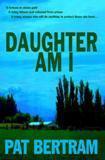Pat Bertram's Blog, page 275
April 2, 2012
Virtual Book Tours
 Virtual book tours became prevalent very quickly. I've heard how great they are — mostly from the major publishers who don't want to spend the money to send their authors on an unvirtual tour — that I wonder how worthwhile blog tours really are. I know the most popular book blogs do help get the word out, but it's hard to get a guest spot on those blogs unless you have a publicity department behind you. Some people who have done tours think the tour helped with sales, other says not. Me? I'm still not sure. I did two tours, and neither seemed to make any difference in sales.
Virtual book tours became prevalent very quickly. I've heard how great they are — mostly from the major publishers who don't want to spend the money to send their authors on an unvirtual tour — that I wonder how worthwhile blog tours really are. I know the most popular book blogs do help get the word out, but it's hard to get a guest spot on those blogs unless you have a publicity department behind you. Some people who have done tours think the tour helped with sales, other says not. Me? I'm still not sure. I did two tours, and neither seemed to make any difference in sales.
I've read that for most authors, the real benefit of doing a book signing in an offline store is the connection one makes with the bookseller, and perhaps the same holds true with a virtual book tour. I've made connections with other bloggers, introduced my books to people who would not otherwise have discovered them, and talked about my books with those who have read them.
Setting up a blog tour is easy, though time-consuming. You need to research blogs to find the best fit, and then you need to query the blogger. If you are invited to be a guest on the blog, you need to find out what is expected of you — an article, an interview, a giveaway — and you need make sure that every article you write, every response in an interview is different and appealing.
People will not follow your blog tour if you keep recycling the same article. Make sure you send your guest post, a bio, a photo of you, a photo of your cover days in advance. Then on the day the article is posted, you need to visit the blog several times and respond to comments.
A disconcerting aspects of my tours was how few bloggers did anything beyond posting the article. No mention on Facebook, no Twitter, no promotion of any kind. So, the main thing is, make sure you do what you can yourself to promote. Which meant, for me, two blog articles a day, one for the host, and one for my blog to promote the host. Plus Facebook status updates, posting the link on my profile, and Twittering.
The tours were fun and challenging, and I've certainly did what I could to launch my last two novels, but will I do it again? Possibly. I have a hunch the benefits of a tour are long term, and the more one does to get their name out there, the better the chance of getting known, but I'm still not convinced they were worth all the effort.
Tagged: blog tour, blogs, book promotion, virtual book tours








April 1, 2012
Purposely-Flawed Characters. Or Not.
Interesting characters make interesting stories, not the other way around. An author develops interesting characters by putting them under pressure, giving them much to lose, and letting them change because of their experiences. And the author makes these characters at least a bit larger than life. Who wants to read about characters who sit around watching television all the time or who repeatedly have the same tiresome argument with their children or who can't resolve their problems? We deal with that every day. We don't need to read about it. On the other hand, if the traits are too idealized, characters come across as comic book silly.
Depth of character is revealed in the choices a character makes while at risk. Without the element of risk, there is no real story, only a string of episodes. Think what Superman would be like without Kryptonite — totally uninteresting and flawed in his perfection. But Kryptonite is a purposeful flaw, put there to make Superman more interesting, which makes him seem even more of a comic book character. Oh, wait. He's supposed to be a comic book character!
To offset the problem of idealized characters, many writers try to create a purposely-flawed character, such as a boozing cop or a mother who can't communicate with her teenager, but this seems an unnecessary distraction unless, of course, it is a vital part of the character's motivation. So many flawed characters, particularly the hero with a drinking problem, have been done to death. I know there is a long tradition of hard-drinking detectives, but there has to be a more creative way of giving characters flaws. Or not. Writers are so enthralled with the idea of flawed heroes, that they are missing the point. They don't have to give their heroes obvious flaws. Writers are flawed. By making their heroes realistic, the heroes are automatically flawed.
A character must lose occasionally or make mistakes. Where is the suspense if every time a character attempts to do something she succeeds? And in that loss is a shadow of the flaw, because the setback must be realistic. Did the character lose because of arrogance, assuming she knew what to do when she didn't? Did the character lose because she wasn't physically fit or knowledgeable enough? Did the character lose because she didn't plan correctly, because she was unfocused, because of her inner conflicts? Such losses force a fully realized character to change so in the end she can succeed.
 In the beginning of Daughter Am I, twenty-five-year-old Mary Stuart has no real direction, no purpose, but when she learns she inherited a farm from her recently murdered grandparents — grandparents her father claimed had died before she was born — she becomes obsessed with finding out who they were and why someone wanted them dead. She drives halfway across the country with a feisty crew of octogenarians, friends of her grandparents, and even though she discovers they all had ties to the mob, she doesn't let her good sense override her obsession. This understandable obsession is her flaw (though I did not write her to be a flawed charater), and if she doesn't grow during the course of the story, if she doesn't learn from her setbacks, the obsession could become a fatal flaw. Fatal or not, flaw or not, Mary's obsession makes her real, makes her a bit larger than life, and makes her interesting.
In the beginning of Daughter Am I, twenty-five-year-old Mary Stuart has no real direction, no purpose, but when she learns she inherited a farm from her recently murdered grandparents — grandparents her father claimed had died before she was born — she becomes obsessed with finding out who they were and why someone wanted them dead. She drives halfway across the country with a feisty crew of octogenarians, friends of her grandparents, and even though she discovers they all had ties to the mob, she doesn't let her good sense override her obsession. This understandable obsession is her flaw (though I did not write her to be a flawed charater), and if she doesn't grow during the course of the story, if she doesn't learn from her setbacks, the obsession could become a fatal flaw. Fatal or not, flaw or not, Mary's obsession makes her real, makes her a bit larger than life, and makes her interesting.
Tagged: creating interesting characters, Daughter Am I, depth of character, flawed characters, Superman








March 31, 2012
Way Cool Global View of My Blog!
Here is a global view of the views of my blog for the last week:
As you can see, the vast majority of my blog views come from the United States, but here are the number of views I've had from other countries during the past week:
 United Kingdom
United Kingdom111
 Canada
Canada106
 India
India59
 Australia
Australia55
 Philippines
Philippines19
 Singapore
Singapore18
 New Zealand
New Zealand11
 Malaysia
Malaysia10
 Viet Nam
Viet Nam8
 Germany
Germany6
 Pakistan
Pakistan6
 Botswana
Botswana6
 Denmark
Denmark5
 Nepal
Nepal5
 South Africa
South Africa5
 Switzerland
Switzerland5
 Turkey
Turkey4
 Taiwan
Taiwan4
 Japan
Japan4
 Greece
Greece3
 United Arab Emirates
United Arab Emirates3
 France
France3
 Lebanon
Lebanon3
 Thailand
Thailand3
 Finland
Finland3
 Norway
Norway3
 Georgia
Georgia2
 Czech Republic
Czech Republic2
 Belgium
Belgium2
 Qatar
Qatar2
 Iceland
Iceland2
 Bulgaria
Bulgaria2
 Bosnia and Herzegovina
Bosnia and Herzegovina2
 Sweden
Sweden2
 Hong Kong
Hong Kong2
 Ethiopia
Ethiopia2
 Portugal
Portugal2
 Russian Federation
Russian Federation2
 Netherlands
Netherlands2
 Republic of Korea
Republic of Korea2
 Jamaica
Jamaica2
 Trinidad and Tobago
Trinidad and Tobago2
 Poland
Poland2
 Brunei Darussalam
Brunei Darussalam1
 Uganda
Uganda1
 Ireland
Ireland1
 Spain
Spain1
 Bahamas
Bahamas1
 Indonesia
Indonesia1
 Albania
Albania1
 Brazil
Brazil1
 Armenia
Armenia1
 Tunisia
Tunisia1
 Cyprus
Cyprus1
 Paraguay
Paraguay1
 Argentina
Argentina1
 Namibia
Namibia1
 Peru
Peru1
 Chile
Chile1
 Costa Rica
Costa Rica1
There was also one view from Italy, which didn't show up on the table for some reason.
If you have a WordPress blog, you too can see these amazing statistics for your blog. Just go to http://wordpress.com, log in, then click on the My Stats tab on the WordPress home page, then scroll down a bit to find the global stats. If you'd like to see your views by country for a week, click on summaries. Isn't that cool?
So, where do your viewers come from?
Tagged: blog views, views by country, wordpress blog, wordpress home page, Wordpress stats, Wrodpress

March 30, 2012
What is the easiest part of the writing process? What is the most difficult?
 The easiest aspect of writing for me is editing. The words are all there, it's just a matter of making sure they are the right ones and that they say what I want them to say. The most rewarding is knowing I wrote a book worth reading. People tell me they really enjoy Daughter Am I, that they "hate saying goodbye to these wonderful characters."
The easiest aspect of writing for me is editing. The words are all there, it's just a matter of making sure they are the right ones and that they say what I want them to say. The most rewarding is knowing I wrote a book worth reading. People tell me they really enjoy Daughter Am I, that they "hate saying goodbye to these wonderful characters."
The most difficult part of writing for me right now is just sitting down and writing. I have no real inclination to write fiction, and I find it hard to focus on a long project. I'm sure the desire will come back, probably when I stop spending so much time on the Internet.
Here are some responses from other authors about the easiest and hardest parts of the writing process. The comments are taken from interviews posted at Pat Bertram Introduces . . .
From an interview with J J Dare, Author of False Positive and False World
The easiest part of the writing process is inspiration. When it's there, the words flow like a raging river. If the story is in my head and I've been tapped by my muse (and she stays with me), I can write a novel in a week.
The hardest part of the writing process is inspiration. When it's not there, it can't be faked. Constipated writing can be unbearable.
From an interview with Dale Cozort, Author of "Exchange
For me, the easiest part is writing the rough draft. Once I have characters and a plot outline I can write the rough draft of a novel in four to six weeks and I enjoy doing it. What happens before and after writing the rough draft is far more difficult and time-consuming.
The most difficult part is the last five percent of the editing process, the part that gets you from almost the right words to exactly the right words. For me that takes more time than writing the rough draft.
From an interview with A. F. Stewart, Author of Once Upon a Dark and Eerie
For me, the easiest element of writing is the dialogue. I rarely have a problem with the flow of dialogue. Possibly because I can hear all those character voices whispering in my head.
The most difficult part is writing the middle section of the plot. I'm great at churning out beginnings and endings, but I always have to work at writing the stuff in between.
So, for you, What is the easiest part of the writing process? What is the most difficult?
(If you'd like me to interview you, please check out my author questionnaire http://patbertram.wordpress.com/author-questionnaire/ and follow the instruction.)
Tagged: Daughter Am I, easiest part of writing, editing, hardest part of wriitng, Inspiration, rough draft

March 29, 2012
Excerpt From "Grief: The Great Yearning" — Day 3
 So many people have told me lately that I should write a book about grief, that I realized somehow I'm not getting the point across — I did write a book about grief, and it is now pubished.
So many people have told me lately that I should write a book about grief, that I realized somehow I'm not getting the point across — I did write a book about grief, and it is now pubished.
I never actually set out to write a book, never planned to make any of my writing public (except for the blog posts, of course), but I was so lost, so lonely, so sick with grief and bewildered by all I was experiencing, that the only way I could try to make sense of it all was to put my feelings into words. Whether I was writing letters to my deceased life mate/soul mate or simply pouring out my feelings in a journal, it helped me feel close to him, as if, once again, I was talking things over with him. The only problem was, I only heard my side of the story. He never told me how he felt about his dying and our separation. Did he feel as broken as I did? Did he feel amputated? Or was he simply glad to be shucked of his body, and perhaps even of me?
People always mention how my pain shines through my words, yet at the beginning, I was in such shock, I didn't feel much. Two years later, I still miss him, still hate that he's dead, though I don't have the physical trauma that I did, and I have regained some of my energy. It truly shocked me how exhausting grief is, but then, most of what I experienced shocked me. I never expected to feel this sort of grief. Never knew it was possible.
Excerpt from Grief: The Great Yearning
Day 3, Grief Journal
This was a hard day, though I don't suppose any of them will be easy for a while. It's amazing how little energy I have. I can't do much at all. Today I rewound some of Jeff's video tapes, the ones we watched toward the end. Perhaps tomorrow I will find the strength to put them away.
The hospice nurse came and got rid of the drugs. (Dumped them in a plastic bag of kitty litter, which turned them into a solidified mess, and took them with her.) The medical supply people are supposed to come tomorrow to pick up the oxygen tank. It's like I'm rewinding his life. I wish I could rewind it back to the good times. We did have good times. I know we did. But everything got so muddled at the end. All we were doing was struggling to survive.
I can't believe there was ever a time I wished the struggle were over so I could start my new life. How could I not have known I'd feel such pain? I heard today that losing a long-time mate was like an amputation, and that's exactly what this feels like.
Good, bad, indifferent—it was all the same. We were together. We took care of each other. And now he's been amputated from me and my life.
I got furious on his account today. It's so unfair that he had such ill health, that his life ended too soon and too terribly. It seems unreal, now, that we took for granted he would die young. Shouldn't we have railed against it more? But he was so disciplined, focusing his energies on trying to prolong his life and be productive.
I don't know which is worse, the times I miss him dreadfully or the times I concentrate on doing something and he drifts from my thoughts. It seems such a betrayal. If he only exists in my memory and I don't think about him, it's as if he's dying again. And once was hard enough. It takes my breath away when I realize I will never talk to him again. Well, I will talk to him, and I do, but we will never converse. I will never hear his voice.
I thought I was through telling people our sad little tale, but I've remembered a few others I have to notify about his being dead. I hope I don't start crying when I talk to them. I'm tired of crying, tired of feeling sick to my stomach, tired of the hole in my chest. How do people endure such grief for months on end? I truly hate that he's gone. Hate it!!
***
Click here to find out more about Grief: The Great Yearning
Tagged: grief as amputation, Grief: The Great Yearning, hospice, third day of grief

March 28, 2012
Two Years and One Day of Grief
 Today I embark on my third year of grief since the death of my life mate/soul mate, and I am now in uncharted territory.
Today I embark on my third year of grief since the death of my life mate/soul mate, and I am now in uncharted territory.
The first year of grief passes in a blur of angst, emotional shock, myriad physical reactions, painful surprises about the nature of loss and grief, and the almost impossible effort of going through the chores of living.
The second year of grief is one of learning to deal with the truth that he is dead, and that there is nothing you can do about it. No matter how well you deal with your grief, no matter how you rise to the challenge of life without him, he is not coming back. You knew this, of course, but now it has seeped deeper into your consciousness, and you feel it with every breath you take. Because of this, the second year (or at least parts of it) can be worse than the first. What makes the second year even harder to face is that you've used your grief card. Everyone thinks you should be over your grief, and they have little patience for your continued tears. They urge you to get on with your life, but they don't understand that this is how you are getting on with your life.
The third year of grief is . . . I don't yet know since this is only the first day of this new year. Today feels no different from yesterday or the day before, and I don't imagine tomorrow will feel any different.
During the past two years, I've been looking for the bedrock of my new life — the thing, the idea, the place, whatever that bedrock might be — that gives me a foundation on which to build a future. Mostly, I've been waiting for my grief to dissipate so I can find my way, but the truth is, I will always grieve for him, though perhaps not as actively as I have been, because he will always be dead.
Acceptance is supposed to be one of the stages of grief, but I've never actually reached that stage (nor did I experience most of the supposed stages of grief). I cannot accept that he is dead for the simple reason that it's not my place to accept it. Acceptance to me suggests that it is okay, and I will never believe that it is okay for him to be dead (even though I do understand the necessity of it). Perhaps acceptance only means that I accept the reality of my continued sorrow and loneliness.
People tell me that you never do get over such a grievous loss, but that after three to five years you rediscover the importance of living. It might be easier to meet the future head-on if I'm not expecting my sadness to dissipate. Maybe this is my bedrock — the missing, the yearning, the sadness, the loneliness. If so, I just need to accept that they are part of my life, and build from there.
Tagged: death, death of a soul mate, first year of grief, grief acceptance, loss, second year of grief, third year of grief








March 27, 2012
Two Years of Grief
 A year ago today, my life mate/soul mate died of inoperable kidney cancer. Wait . . . what am I saying? One year? No. It's been two years since he died. What a strange error to have made, yet perhaps it's understandable. The night he died is still so very clear, as if he's been gone only months, not years.
A year ago today, my life mate/soul mate died of inoperable kidney cancer. Wait . . . what am I saying? One year? No. It's been two years since he died. What a strange error to have made, yet perhaps it's understandable. The night he died is still so very clear, as if he's been gone only months, not years.
On the recommendation of his hospice nurse, I'd taken him to the hospice care center in the hopes that they could figure out how to regulate his drugs to give him the most lucidity and the least pain. It crushed my heart to take him there. I never got to talk with him again — he was in a drug-induced coma for those last five days of his life. I think he was at peace the final two days, though. All the time he was there, his breathing sounded like moaning, and I worried that he was in pain, but during his next-to-last day he exhaled a few melodious-sounding breaths, as if he wanted to reassure me he was okay.
He once told me that if it ever came to his being in a facility, he didn't want me to visit, but how could I not? Even though the care center was sixty-five miles away, I went there every day, but I left early enough so I could get home before dark. The irony is he agreed to go so I could get some rest, but I never did sleep those nights. I was too worried about him.
His last night, Friday night, I didn't go home. A few snowflakes fell and I used that as an excuse to stay. Also, I was restless, sensing the end was near. So I waited.
Around 1:30 in the morning, his breathing changed. Became harsher. I went to his side, said it was okay for him to leave, that I would be all right. At 1:40, he took a breath. His Adam's apple bobbed once. Twice. And then he was dead. I kissed him by the side of his mouth. Waited a few minutes before I went to get the nurse.
I like that I got to tell them he was gone rather than have them tell me.
The nurse confirmed that he was gone. She called the funeral home, and I sat there in the room with him for two hours, just waiting. I might have cried. I might have been numb. I don't really remember. I couldn't even see his face — they had cleaned him and wrapped him in a blanket — so I just sat there, thinking nothing until almost dawn, when they came for him. (They came in an SUV, not a hearse. And they used a red plush coverlet, not a body bag.)
I followed them outside, watched them put him in the SUV and drive away, then I left. The highway was dry, but about halfway home, I skid. (I must have hit a patch of black ice, because there was no indication that patch of road was any different from what I'd already traveled.) I went careening, around and around, back and forth, my car totally out of control. I thought I was going to die, but oddly, I never left the road. The car finally came to a halt facing the wrong way on the highway. I was fine. So was the car. I remember wondering if he had stopped by on his way out of this world to leave me a final reminder to be careful, or maybe he was shaking his ghostly head, thinking that after his being gone only two hours, I was already getting careless.
He always worried that I wasn't careful enough. I'm trying to be careful. Trying to take care of myself. I hope he's taking care of himself.
The past two years have been agony for me. I know there was no way he could have continued to live considering the vast extent of the tumors. I know death was the only way to set him free from his excruciating pain. When he died, I truly was relieved. And yet . . . he was my best friend, my playmate, my business partner, my life companion. He was the one person who listened to me, who was always there for me. (As I was for him.) Even though I can see the necesssity of his death, I hate that he's gone from this earth.
Not one of the previous 731 days have passed without my missing him. Even as I go on with my life, even as he and my grief recede further from me, I will continue to miss him. He was a good man. The earth is poorer for his death.
Tagged: death, death of a soul mate, dying, loss, two year anniversary of grief








March 26, 2012
Grief — Two Years Minus Five Hours
 In five hours, it will be exactly two years since my life mate/soul mate died of inoperable kidney cancer. He and I shared so much that even as I am getting to where I can accept the situation, even accept that I might find peace or possibly happiness, I can't forget that it's at his expense. I wonder what this feels like from his perspective. I know he wants me to go on, to get what I can from life — he told me that — but still, where is he in all this? At some point, our separation has to be complete, doesn't it? I have to realize that whatever I say or think or do has no affect on him — it can't change anything that happened. It can't bring him back. And I don't want him back — his death was too hard-won.
In five hours, it will be exactly two years since my life mate/soul mate died of inoperable kidney cancer. He and I shared so much that even as I am getting to where I can accept the situation, even accept that I might find peace or possibly happiness, I can't forget that it's at his expense. I wonder what this feels like from his perspective. I know he wants me to go on, to get what I can from life — he told me that — but still, where is he in all this? At some point, our separation has to be complete, doesn't it? I have to realize that whatever I say or think or do has no affect on him — it can't change anything that happened. It can't bring him back. And I don't want him back — his death was too hard-won.
Iron Sam, the dying hit man in my novel Daughter Am I, told my hero Mary that a person experiences death only once. Well, my mate's dying was my experience of death. The utter undoableness of it — the finality — shocked me to my core (and still gives me that falling-elevator feeling of panic when I think of his being dead). That shock must be what can only be experienced once. A prognosis of my own death probably won't have the same impact on me as his diagnosis. Will I have his strength, his courage? I won't have him, and that might not be a bad thing. Maybe my death will be easier to handle if I know I'm not going to devastate anyone when I go. (I think about that, how hard it must have been on him to know he wouldn't be here to comfort me after he was gone.)
People always talk about finding someone to grow old with (and oh! I so do not want to grow old alone), but I'm not sure growing old with someone is a blessing. Lately, I've been seeing a lot of very old couples (this area is filled with hospitals, doctors offices, oncology clinics, pain treatment centers, nursing homes) and I try to imagine what it would be like for the two of us to deal with each other's old age infirmities. I'm glad he'll be spared that. It was hard enough for him to die without having to worry about my dying, too.
I wish he were waiting for me on the other side of grief so we could start a new life together, and in a way he will be there — he is still so much a part of me. Maybe literally a part of me. If we're all made of stardust, if everything is commingled, how much more commingled are we who spent so many decades in each other's company! The biorhythms of people who live together ebb and flow in sync. Benign and not so benign viruses carry cell information from one to the other, intermingling physical bodies on a cellular level. As one of my fellow bereft reminded me yesterday, "The heart puts out an electrical field which is measurable and it intertwines with the electrical field of the other loved one and when that is gone, the body knows it and feels the loss."
I've heard that every seven years a person's cells completely turn over, so that in seven years you become a different person. In seven years, then, maybe I won't feel such yearning for him since he will no longer be written into the fabric of new cells. But beyond the physical commingling, there are all the movies we watched together, the books we shared, the thousands upon thousands of hours of electric conversation, the ideas we developed, the businesses we created — all those are part of me.
But there is so much that will never be part of my life again. His smile nourished my soul, his laughter warmed my heart, his voice soothed my ears, his wise counsel eased my mind.
How have I survived such enormous losses? One day a time, that's how. Sometimes one tear at a time. And so two years (minus five hours) have passed.
Tagged: death, finality of death, loss, Second anniversary of grief, shock of death, surviving grief, two years of grief








March 25, 2012
Still Confounded by Grief
 For two years, my reaction to the death of my life mate/soul mate has bewildered me. I knew he was dying and I'd spent over a decade preparing myself for that eventuality. I thought I'd accepted the inevitable, but now I see I was merely resigned (and perhaps exhausted). Still, I am independent-minded, always have been. I know how to do things on my own, know how to entertain myself, know how to take care of myself. I've never been afraid of being alone, never been one to hide behind pretty lies or protective fantasies. And yet his death devastated me as much as it confounded me. In fact, after almost two years (two years minus two days, to be exact; 729 days) I still feel lost, still feel broken.
For two years, my reaction to the death of my life mate/soul mate has bewildered me. I knew he was dying and I'd spent over a decade preparing myself for that eventuality. I thought I'd accepted the inevitable, but now I see I was merely resigned (and perhaps exhausted). Still, I am independent-minded, always have been. I know how to do things on my own, know how to entertain myself, know how to take care of myself. I've never been afraid of being alone, never been one to hide behind pretty lies or protective fantasies. And yet his death devastated me as much as it confounded me. In fact, after almost two years (two years minus two days, to be exact; 729 days) I still feel lost, still feel broken.
Not all deaths affect people the same. My mother died three years before my mate, and my brother died a year before that. My grief for them was what I used to consider "normal." I missed them and felt bad that they were gone, but my life went on without any major upheavals. But when my mate died, it was a cataclysm, affecting every part of my life. And the strong connection we always had, a cosmic-twin sort of connection, was broken.
The day before my mother's funeral, I broke my ankle, so I spent her viewing at the emergency room and I spent her funeral at the bone specialist. It turns out that what I had was a very bad sprain, so bad that when the ligaments tore away, they cracked the bone.
I realize now this same sort of thing happened when my mate died. Whatever connection we had was so strong that when he was torn away from me and our life, it fractured me. This fracture had nothing to do with my being weak or too dependent on him or unwilling to face the truth or any of the other snide rationalities people have made about my sorrow. However deep and prolonged, my grief for him is normal and understandable. It takes a long time for a broken bone to heal and regain its former strength. How much longer must it take when one's psyche has been broken.
And so, I still deal with the fracture his death caused in me, and I still deal with the bewilderment of his death. Perhaps when he died, he took a chunk of me with him, the same way bone still adheres to torn ligaments, and so part of me would be wherever he is, if he is. His death felt like an amputation, and I can no longer feel that part of me where we were attached. Some people still feel connected to those who are gone, but I never do. I merely feel his goneness, his absence, which seems as strong as his presence once did. And I still feel fractured. Still feel lost. Perhaps to a certain extent I will always feel this way, because the cause of this loss, his being dead, will always be a part of me. And that is one truth I wish I didn't have to face.
Tagged: cosmic twin, death of a soul mate, grief, loss, normal grief, two years of grief








March 24, 2012
Anniversaries of Grief
 I don't know why certain anniversaries loom so large in our lives, but for whatever reason, the anniversaries of grief are immense. At the beginning of my grief over the death of my life mate/soul mate, a minister friend told me that always on the anniversary, even if I'm not consciously aware of the date, I will feel an upsurge of grief. This is only my second anniversary, with perhaps dozens still to come, but I can already see the truth of his words. Grief comes from somewhere deep within, somewhere deeper than thought, somewhere deeper than volition. And it keeps track of time.
I don't know why certain anniversaries loom so large in our lives, but for whatever reason, the anniversaries of grief are immense. At the beginning of my grief over the death of my life mate/soul mate, a minister friend told me that always on the anniversary, even if I'm not consciously aware of the date, I will feel an upsurge of grief. This is only my second anniversary, with perhaps dozens still to come, but I can already see the truth of his words. Grief comes from somewhere deep within, somewhere deeper than thought, somewhere deeper than volition. And it keeps track of time.
People who have not experienced a grievous loss often think that grief is a choice. Sometimes, especially when young children are involved, the remaining parent can put off grief to focus on the childrens' needs, but still, grief will surface at the anniversary. Later in life, this grief will surface again, perhaps when the last child leaves home, or when a beloved pet dies. I know a woman who went from taking care of a dying husband to taking care of her aged mother. She didn't grieve after the death of her husband because of this new focus, but the death of her mother about destroyed her. For most of us, though, grief cannot be denied. We embrace it or it embraces us, and we reap the whirlwind.
This anniversary phenomena does mystify me, though. I've been experiencing a devastating grief upsurge, and yet nothing significant happens on the anniversary to count for all the sorrow. In fact, if last year is anything to go by, the day itself will be peaceful, bringing with it a quiet gladness that he was in my life. But the anniversary is not the end of anything. In fact, it is the beginning of something even worse — the beginning of another year without him. Another year where he is dead. Another year of trying to build a future on the ashes of our shared past.
The worst thing, of course, is that I've had two years of living in a world where he does not exist. The sheer goneness of him builds rather than dissipates. He is more gone now than he was two years ago, and next year he will be even more gone. Apparently, one can get used to anything, so eventually I'll simply get used to the feeling of emptiness he left in the world, perhaps even learn to look beyond the blank space on Earth he once inhabited.
I hope, of course, I will be able to find a new life. Or do I mean a new focus? Because, of course, this is my life and always has been. It was my life before I met him, it was my life while we were together, and it is still my life, as alien as it feels. And as much as I hate that he is dead, as much as I fight the idea that I am still alive, the truth is that he is, and that I am.
Tagged: anniversaries of grief, dealing with grief, death, loss, Second anniversary of grief












